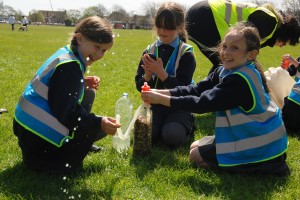Ten local primary schools from Brighton and Hove have successfully taken part in a new environmental education programme on the local water cycle called Our Water Matters.

Our Water Matters (OWM) is a dedicated learning programme for children in local primary schools within the Brighton and Lewes Downs Biosphere. It teaches them about the special nature of our local water cycle through a set of innovative resources both outside the classroom and in a ‘virtual’ water world.
OWM offers pupils studying the water cycle, as part of the Key Stage 2 national curriculum, a tailor-made approach to engage with the unique character of their local environment. They are guided to uncover the hidden process of where water comes from and goes to, and how it provides all of our drinking water.
OWM has worked with social enterprise Block Builders to create a virtual model of the Biosphere area using the popular educational game software Minecraft Edu. It allows children to explore their local environment and water cycle from high up in the clouds to deep down underground – without leaving their classroom!
The virtual learning is complemented by real-world outdoor school visits, led by local company SoSussex, to their local park or other green space, to take part in practical activities including role-play games and using working water models.
Class teacher Julian Robertson, from St Mary’s Catholic Primary School, said: “The ‘Our Water Matters’ session was a fabulous way for our children to see the water cycle in action, and the experiments and talks clearly improved their understanding. The project was well run, informative and most importantly, fun!”
The schools which have joined in OWM so far are Coldean, Coombe Road, Fairlight, Moulsecoomb, the Pupil Referral Unit (PRU), Stanford Juniors, St Margaret’s, St Marks, St Mary’s and West Blatchington.
The pupils’ resulting learning from both virtual and physical methods is the subject of a research study by the University of Brighton, to investigate the effectiveness of each approach and determine how children can best connect with the elements of their local environment.
This first phase of the OWM programme received financial support from the University of Brighton, through the ‘Widening Participation’ initiative, and Brighton and Hove City Council’s public health team, and was facilitated by the Brighton and Lewes Downs Biosphere programme.
Expressions of interest from more local schools are now being invited to participate in the proposed second phase of activities in the autumn term, for which new funding support is being sought.








